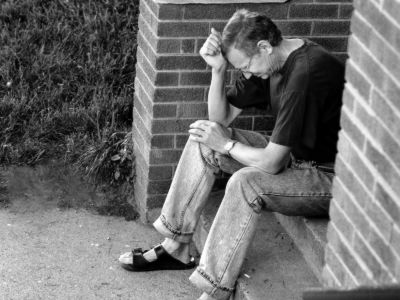A survey of more than 50,000 people reveals the attributes of people who tend to fall into loneliness

by
In modern society, social connections are weakening, and it is said that the number of chronically lonely people is increasing at the level of infectious diseases . University of Queensland and the Australian National University researchers is, 'lonely cancer claims that should be addressed regarded as dangerous' cancer of society 'to the same level', about the loneliness in prone social group Explaining.
Loneliness is a social cancer, every bit as alarming as cancer itself
https://theconversation.com/loneliness-is-a-social-cancer-every-bit-as-alarming-as-cancer-itself-126741
Some people think that `` how much loneliness is a problem, but it is not like dying '', but as a result of meta-analyzing nearly 150 studies on social connection and risk of death, social connection And lack of social support have been shown to have a significant health impact. The increased risk of death caused by loneliness was more than that of poor eating habits, obesity, alcohol consumption, lack of exercise, and was at the same level as heavy smoking.
On the other hand, it is clear that many people do not regard loneliness as much. Research teams such as Prof. Alex Haslam from Queensland University, Prof. Catherine Haslam and Tegan Cruwys from Australian National University have asked people in the UK and the US , that ask them to answer in the ranking format ' survey was carried out. As a result, people were able to predict the physical health behavior almost accurately, but there was a tendency to underestimate the risk for social factors such as loneliness.
Many people tend to care about financial issues such as post-retirement pension plans, but the research team said, “As a factor predicting the physical and mental health of people after retirement, social ties I found that the link is twice as strong. ' The research team regards the fact that loneliness is closely related to health as unknown to the public.

by
A large-scale survey called “ Australia Talk ” conducted by the Australian Broadcasting Corporation in July 2019 asked about 54,000 people living in Australia and asked about 500 daily life questions. In this survey, a question about `` people's loneliness '' was also conducted, and respondents asked about loneliness that they felt from choices such as `` completely '' `` almost '' `` sometimes '' `` frequently '' `` always '' Selected. The research team pointed out that “only 54% of the total responded that they did not feel utterly or“ almost ”lonely,” and pointed out that nearly half of the people felt lonely. doing.
As a result of Australia Talk, the following four groups with many people who feel lonely were identified.
◆ 1: Youth
Only about 32% of people between the ages of 18 and 24 said they felt “not at all” or “almost” loneliness, and 30% said they felt lonely or “always” Answered. On the other hand, the percentage of senior citizens who answered that they did not feel loneliness “at all” or “almost” reached 71%, and the elderly were less lonely than the young.

by
◆ 2: Urban residents
Compared to rural people, the percentage of people who answered that they do not feel “lonely” in urban areas is 5% less, and the percentage of people who feel lonely “sometimes” “frequently” “always” It seems to be expensive. “The results show the reality that loneliness is psychological,” the research team pointed out.
◆ 3: Supporters of extreme right parties
Interestingly, the supporters of “ One Nation ”, Australia ’s extreme right party, turned out to be more lonely than those of other parties. The percentage of those who answered “always” lonely recorded 9% among supporters of One Nation, but only 2% of supporters of other parties. The research team said that the result of feeling “disengaged from the world” could drive people to radical politicalism.
◆ 4: Low-income people
It also seems that low-income people are more likely to feel loneliness than high-income people. For those who earn less than 600 Australian dollars a week (about 44,000 yen), 21% actually felt lonely and 'always', but 3,000 Australian dollars a week (about 222,000 yen) ) Among those who earn more, only 10% of people feel lonely “frequently” or “always”. This indicates a strong link between poverty and loneliness, meaning that the negative effects of poverty extend to the psychological side.

by 1820796
This Australian Talk has revealed that loneliness is not only a personal problem for a small number of people, but has permeated society to a level that can no longer be ignored. Based on this result, the research team argues that “people should rebuild social connections and be as wary of loneliness as cancer”.
Related Posts:
in Note, Posted by log1h_ik







